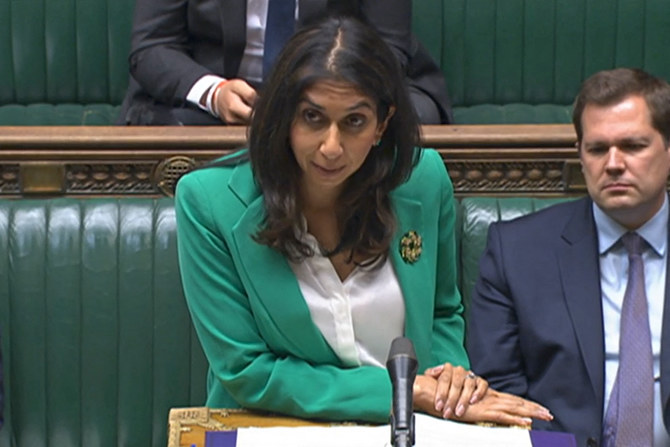LONDON: Home Secretary Suella Braverman, who is known for her hard-line rhetoric about migrants, called a court ruling issued Thursday that blocks its plan to deport asylum seekers to Rwanda “disappointing” and said the central African country was “safe.”
A British court ruled that a UK government plan to send asylum-seekers on a one-way trip to Rwanda is unlawful, delivering a blow to the Conservative administration’s pledge to stop migrants making risky journeys across the English Channel.
“The decision today, as I’ve said, is disappointing,” she told reporters. “We respectfully disagree with the court judgment, but it’s important to note that there are some elements upon which we were successful in the decision and that actually Rwanda we believe is a safe country.”
In a split two-to-one ruling, three Court of Appeal judges said Rwanda could not be considered a “safe third country” where migrants from any country could be sent.
Braverman said that the existing asylum system “incentivizes mass flows of economic migration into Europe, lining the pockets of people smugglers and turning our seas into graveyards, all in the name of a phony humanitarianism.”
Earlier, she told Parliament that “two of the judges were of the view that there were deficiencies in the Rwandan asylum system that risked there being a breach of article 3 of the ECHR (European Convention on Human Rights).”
She added that “their concerns were not that conditions in Rwanda would be unsafe, but that there was a possibility that they could be returned to other countries from Rwanda where they may suffer ill treatment.”
She also said that her government “will do whatever it takes, for the British people, to stop the boats,” adding that they would appeal the court’s decision.
“We maintain a high level of confidence in the lawfulness of the policy, we are committed to delivering it and we’re committed to working in partnership with Rwanda,” Braverman said.
The UK and Rwandan governments agreed more than a year ago that some migrants who arrive in the UK as stowaways or in small boats would be sent to Rwanda, where their asylum claims would be processed. Those granted asylum would stay in the East African country rather than return to Britain.
The UK government argues that the policy will smash the business model of criminal gangs that ferry migrants on hazardous journeys across one of the world’s busiest shipping lanes.
Under an initial 140 million pound ($177 million) deal struck last year, Britain planned to send tens of thousands of asylum seekers who arrive on its shores a distance of more than 4,000 miles (6,400 km) to the East African country, but no one has yet been deported there.
The appeal court ruled deficiencies in Rwanda’s asylum system meant there were substantial grounds for believing that those sent there would be returned to their home nations where they face “persecution or other inhumane treatment.”
“The result is that the High Court’s decision that Rwanda was a safe third country is reversed and that unless and until the deficiencies in its asylum processes are corrected removal of asylum-seekers to Rwanda will be unlawful,” Lord Chief Justice Ian Burnett said.
Burnett himself disagreed with the other two judges, a fact highlighted by Sunak. However, even if the government were to be successful with an appeal to the UK’s top court, deportation flights are very unlikely to begin this year.
Britain’s High Court ruled in December that the policy is legal and doesn’t breach Britain’s obligations under the UN Refugee Convention or other international agreements.
But the court allowed a group of claimants, who include asylum-seekers from Iraq, Iran and Syria facing deportation under the government plan, to challenge that decision on issues including whether the plan is “systemically unfair” and whether asylum-seekers would be safe in Rwanda.
Tackling asylum claims has become a political headache for British Prime Minister Rishi Sunak’s ruling Conservative government in London, which promised to “take back control” of the country’s borders after the UK left the EU.
Sunak said the government would appeal to the UK’s top court after its plan to deport asylum seekers to Rwanda was deemed unlawful, a major blow to his pledge to stop asylum seekers arriving in small boats.
(With Agencies)
















